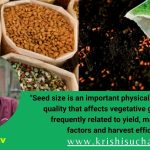Problem in seed sector and recommend solution in present scenario of COVID 19

As a basic agricultural input, seeds play a vital role in developing the resilient agricultural sectors and food systems that determine food security and nutrition, and support the livelihoods of farmers and other actors in the value chain.
The seed industry is truly globalised: A seed lot can be expected to travel through several countries for multiplication, production, processing and packaging before it reaches a farmer. It is also time sensitive, with defined periods for sowing and harvesting different crops. As such, the necessary restrictions on movement and transport put in place by governments to protect their people from COVID-19 have the potential to seriously affect the production, certification, distribution and cost of seed.
Although many countries declare lockdown Nepal also declare it. It limits the mobilization of vehicle throughout the country, a number of issues are emerging related to the business of trade. The increased cost of air transport due to the reduced availability of commercial flights may hamper seed supply chains and on-time delivery of seed. Limits on the mobility of people are affecting a variety of production, trade and sales processes. In addition, delays at borders due to stricter safety measures and fewer personnel are affecting timings and costs. Depending on how long the pandemic and associated confinement measures continue, the seed sector and its associated supply chains could feel the impact of COVID-19 long into the future.
In contrast, increased cost of transportation of seeds, disturbance in production and distribution of quality seeds, communication, collaboration and harmonization of measures among government is critical are the main problem in seed sector due to COVID-19.
The existing problem in seed sector can mitigate by the following solution:
Respect rules and regulations but adapt: Different countries are feeling the impact of COVID-19 in different ways depending on the crop and season (planting or harvesting). Many countries have classified agriculture as an “essential” industry and, as such, certification staff and companies are allowed to continue operating, while obeying social distancing rules. This means staff rotates to limit the number of people in offices and laboratories and wearing special protective equipment when carrying out field inspections, or delegating authority to private sector staff. In cases where company staff are given exceptional authority to carry out certain certification activities, their authority is limited and a notification must appear on the seed lot label.
Communicate and harmonise: Communication helps share best practices and the harmonisation of measures between countries smooth processes. Regional bodies are helping to develop co-ordinated strategies that facilitate trade. Even those countries that do not have a strong seed production sector acknowledge the important role that other seed producing countries play and are supportive of flexible solutions within the current regulatory framework or temporary derogation of Rules and Regulations to facilitate international seed trade.
Stay informed and prepared: As the situation is constantly changing, it is important that policy makers and regulators are regularly receiving accurate, reliable and up to date information.
Continuous assessment will also help anticipate the potential medium and long-term impacts of the crisis. Contingency strategies to enable rapid response in this highly uncertain environment are more important than ever.
Writer: KHEMRAJ UPADHYAYA (Student, Bsc.Ag 4th sem, Paklihawa Campus)

 दिल्लीको होटलमा बसेर क्यानडा र अमेरिकामा मानव तस्करी
दिल्लीको होटलमा बसेर क्यानडा र अमेरिकामा मानव तस्करी  अनलाइन जुवा खेलाएर काभ्रेका अनिलले गरे दुई अर्बको कारोबार
अनलाइन जुवा खेलाएर काभ्रेका अनिलले गरे दुई अर्बको कारोबार  मुख्यमन्त्री सोडारीले विश्वासको मत लिन सुदूरपश्चिमको प्रदेश सभा बैठक आव्हान
मुख्यमन्त्री सोडारीले विश्वासको मत लिन सुदूरपश्चिमको प्रदेश सभा बैठक आव्हान  अफगानिस्तानमा बाढीबाट ३१५ भन्दा बढीको मृत्यु
अफगानिस्तानमा बाढीबाट ३१५ भन्दा बढीको मृत्यु  सुँगुरको मिर्गौला प्रत्यारोपण गरिएका रिचर्डको निधन
सुँगुरको मिर्गौला प्रत्यारोपण गरिएका रिचर्डको निधन 


